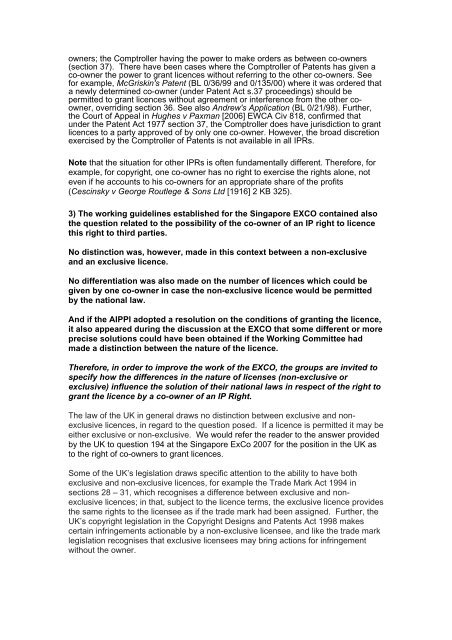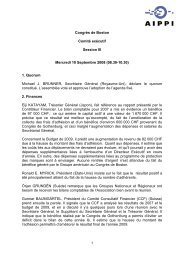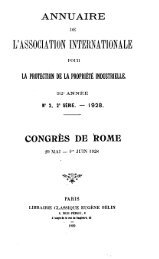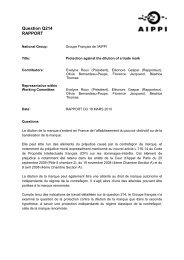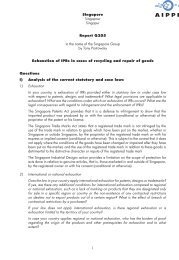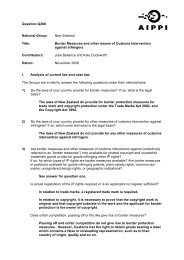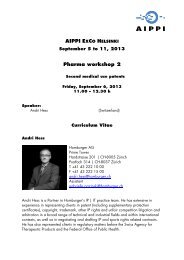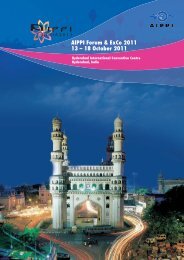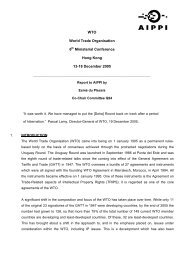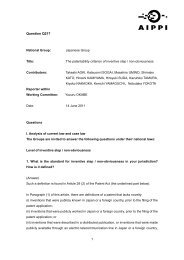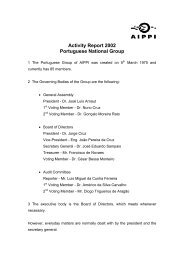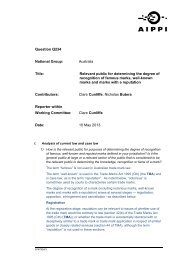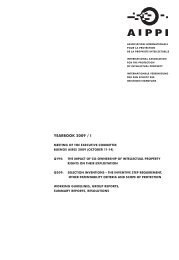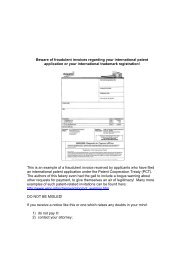Question Q194 National Group: United Kingdom Title: The ... - AIPPI
Question Q194 National Group: United Kingdom Title: The ... - AIPPI
Question Q194 National Group: United Kingdom Title: The ... - AIPPI
You also want an ePaper? Increase the reach of your titles
YUMPU automatically turns print PDFs into web optimized ePapers that Google loves.
owners; the Comptroller having the power to make orders as between co-owners<br />
(section 37). <strong>The</strong>re have been cases where the Comptroller of Patents has given a<br />
co-owner the power to grant licences without referring to the other co-owners. See<br />
for example, McGriskin's Patent (BL 0/36/99 and 0/135/00) where it was ordered that<br />
a newly determined co-owner (under Patent Act s.37 proceedings) should be<br />
permitted to grant licences without agreement or interference from the other coowner,<br />
overriding section 36. See also Andrew's Application (BL 0/21/98). Further,<br />
the Court of Appeal in Hughes v Paxman [2006] EWCA Civ 818, confirmed that<br />
under the Patent Act 1977 section 37, the Comptroller does have jurisdiction to grant<br />
licences to a party approved of by only one co-owner. However, the broad discretion<br />
exercised by the Comptroller of Patents is not available in all IPRs.<br />
Note that the situation for other IPRs is often fundamentally different. <strong>The</strong>refore, for<br />
example, for copyright, one co-owner has no right to exercise the rights alone, not<br />
even if he accounts to his co-owners for an appropriate share of the profits<br />
(Cescinsky v George Routlege & Sons Ltd [1916] 2 KB 325).<br />
3) <strong>The</strong> working guidelines established for the Singapore EXCO contained also<br />
the question related to the possibility of the co-owner of an IP right to licence<br />
this right to third parties.<br />
No distinction was, however, made in this context between a non-exclusive<br />
and an exclusive licence.<br />
No differentiation was also made on the number of licences which could be<br />
given by one co-owner in case the non-exclusive licence would be permitted<br />
by the national law.<br />
And if the <strong>AIPPI</strong> adopted a resolution on the conditions of granting the licence,<br />
it also appeared during the discussion at the EXCO that some different or more<br />
precise solutions could have been obtained if the Working Committee had<br />
made a distinction between the nature of the licence.<br />
<strong>The</strong>refore, in order to improve the work of the EXCO, the groups are invited to<br />
specify how the differences in the nature of licenses (non-exclusive or<br />
exclusive) influence the solution of their national laws in respect of the right to<br />
grant the licence by a co-owner of an IP Right.<br />
<strong>The</strong> law of the UK in general draws no distinction between exclusive and nonexclusive<br />
licences, in regard to the question posed. If a licence is permitted it may be<br />
either exclusive or non-exclusive. We would refer the reader to the answer provided<br />
by the UK to question 194 at the Singapore ExCo 2007 for the position in the UK as<br />
to the right of co-owners to grant licences.<br />
Some of the UK’s legislation draws specific attention to the ability to have both<br />
exclusive and non-exclusive licences, for example the Trade Mark Act 1994 in<br />
sections 28 – 31, which recognises a difference between exclusive and nonexclusive<br />
licences; in that, subject to the licence terms, the exclusive licence provides<br />
the same rights to the licensee as if the trade mark had been assigned. Further, the<br />
UK’s copyright legislation in the Copyright Designs and Patents Act 1998 makes<br />
certain infringements actionable by a non-exclusive licensee, and like the trade mark<br />
legislation recognises that exclusive licensees may bring actions for infringement<br />
without the owner.


